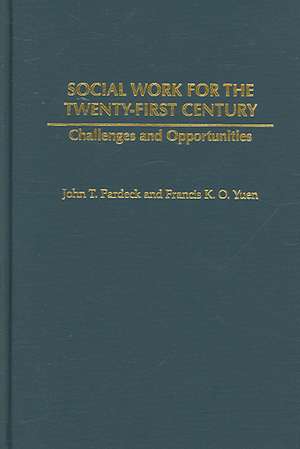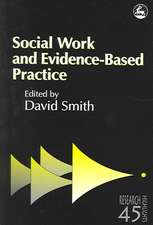Social Work for the Twenty-first Century: Challenges and Opportunities
Autor Francis K. O. Yuenen Limba Engleză Hardback – 29 apr 2006 – vârsta până la 17 ani
Preț: 304.72 lei
Preț vechi: 373.46 lei
-18% Nou
Puncte Express: 457
Preț estimativ în valută:
58.33€ • 63.38$ • 49.03£
58.33€ • 63.38$ • 49.03£
Carte disponibilă
Livrare economică 31 martie-14 aprilie
Preluare comenzi: 021 569.72.76
Specificații
ISBN-13: 9780275978938
ISBN-10: 0275978931
Pagini: 150
Dimensiuni: 156 x 235 x 17 mm
Greutate: 0.35 kg
Ediția:New.
Editura: Bloomsbury Publishing
Colecția Praeger
Locul publicării:New York, United States
ISBN-10: 0275978931
Pagini: 150
Dimensiuni: 156 x 235 x 17 mm
Greutate: 0.35 kg
Ediția:New.
Editura: Bloomsbury Publishing
Colecția Praeger
Locul publicării:New York, United States
Notă biografică
John T. Pardeck is Professor Emeritus in the School of Social Work at Southwest Missouri State University. He is the author of Social Work After the Americans with Disabilities Act: New Challenges and Opportunities for Social Services Professionals (Auburn House, 1998).Francis K. O. Yuen is Professor in the Division of Social Work, California State University, Sacramento.
Cuprins
PrefaceIntroductionDiverse Social Work PracticesA Call for Scientifically Based PracticeAn Analysis of Social Work EducationScholarly Productivity of Social Work Journal ReviewersStrategies for Improving the Profession of Social Work in the 21st Century
Recenzii
In a brief but thoughtful work, Pardek and Yuen examine the role of empirically based research in various aspects of social work and argue for enhancing the role of scientific inquiry throughout the discipline. Their book includes brief but informative chapters examining the role of scientific methodology in current social work practice, professional education, and scholarly publication. Responding to the rise of postmodern theory in the discipline, the authors offer a clear, succinct critique of trends within the profession and provide one vision for its future development. While perhaps somewhat oversensitive to perceptions of their discipline as non-rigorous and anti-intellectual, Pardek and Yuen present strong, persuasive arguments that students, practitioners, teachers, and scholars should carefully consider..A vigorous debate in the profession would be a welcome and appropriate legacy for Pardek, a prolific researcher and noted scholar who passed away while developing this treatise. Highly recommended. Collections supporting social work programs.
Its primary message concerns the tendency among both social work educators and practitioners to draw on intuition, experience and the authority of teachers when applying knowledge to practice challenges. Of course, this is hardly a new complaint, but Pardeck and Yeun deal with it sensitively and reveal a willingness to be flexible and accommodate the insights of non-scientific approaches..The book is a welcome additio to the literature on the challenges facing social work today..The book deserves to be widely consulted by anyone concerned with the issue of how social work can enhance its knowledge base and strengthn its role in both the academy and the world of practice.
Pardeck and Yuen examine the challenges and opportunities for the field of social work, a discipline that is now some 100 years old. Coverage includes discussion of the common methods used in social work practices; the development of social work knowledge using systematic approaches endorsed by science and evidences; considerations for revising professional social work education programs; scholarly productivity of social work journal editors, as a means of using scientific approaches to empirically establish the field's knowledge base and credibility; and other suggested strategies for advancing the profession. For social work scholars, students, and professionals.
Its primary message concerns the tendency among both social work educators and practitioners to draw on intuition, experience and the authority of teachers when applying knowledge to practice challenges. Of course, this is hardly a new complaint, but Pardeck and Yeun deal with it sensitively and reveal a willingness to be flexible and accommodate the insights of non-scientific approaches..The book is a welcome additio to the literature on the challenges facing social work today..The book deserves to be widely consulted by anyone concerned with the issue of how social work can enhance its knowledge base and strengthn its role in both the academy and the world of practice.
Pardeck and Yuen examine the challenges and opportunities for the field of social work, a discipline that is now some 100 years old. Coverage includes discussion of the common methods used in social work practices; the development of social work knowledge using systematic approaches endorsed by science and evidences; considerations for revising professional social work education programs; scholarly productivity of social work journal editors, as a means of using scientific approaches to empirically establish the field's knowledge base and credibility; and other suggested strategies for advancing the profession. For social work scholars, students, and professionals.
















